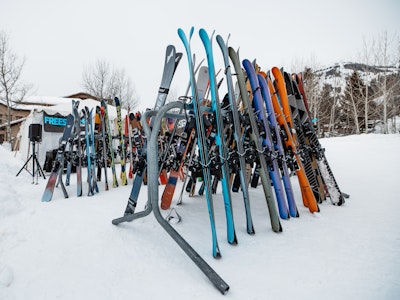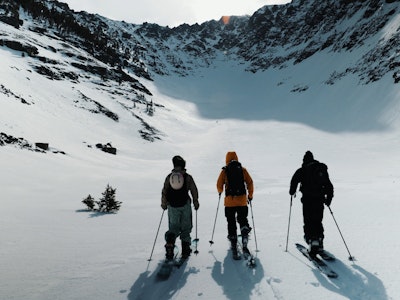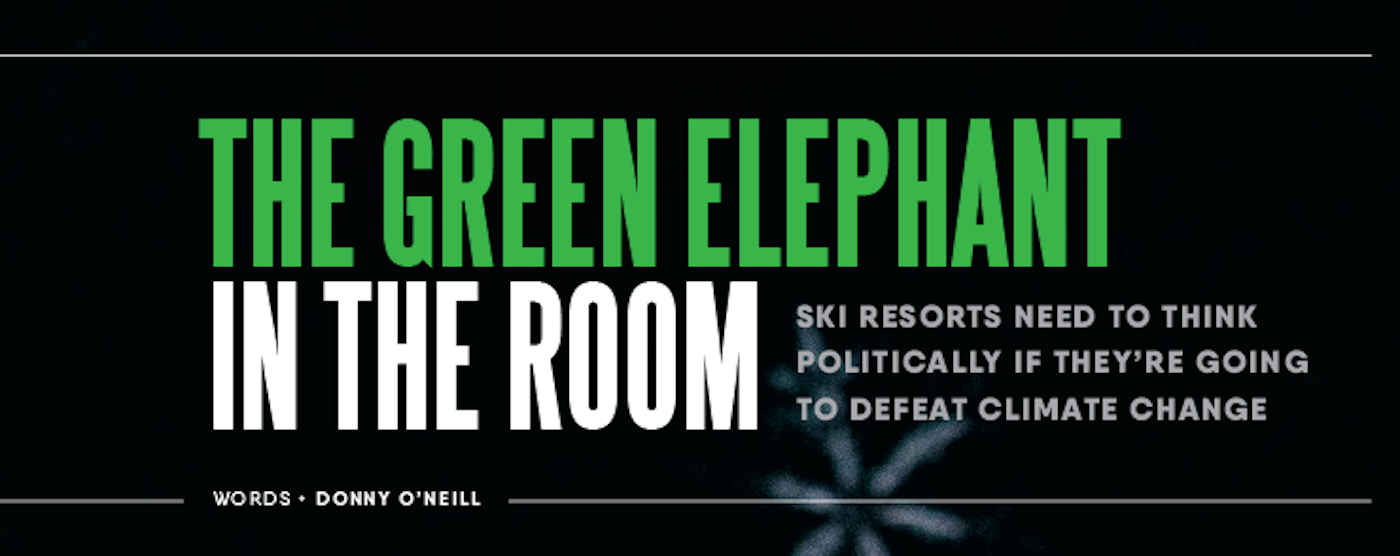
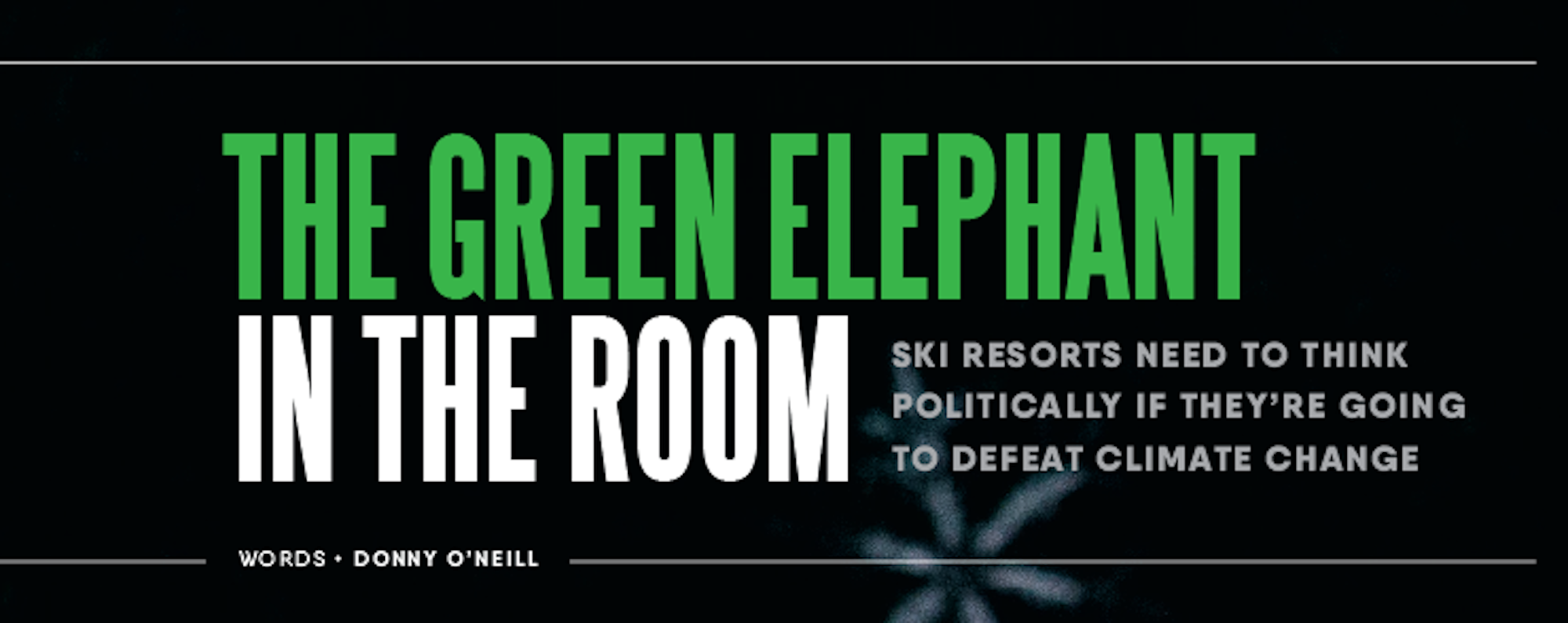
SKIING IS IN DANGER.
According to NASA and NOAA, 2016 was the warmest year on record globally. So was 2015. And 2014, too. In fact, 16 of the 17 warmest years on record have occurred since 2001. With climbing surface temperatures, winter weather has become more extreme and unpredictable. If trends continue, the temperature trajectory will cause the majority of mountain precipitation to fall as rain, snow levels to rise and snow depths to plummet.
In response, the majority of ski resorts across the country have taken steps towards improving on-site sustainability and energy efficiency. Implementing LED light bulbs, cleaner forms of energy, efficient snowmaking systems, composting programs, carpool incentives for guests, banning plastic water bottle use and reducing electrical usage are among the most common tactics.
Today, however, climate change has become a bipartisan issue, and it’ll take more than simply reducing one’s carbon footprint to fix it. Stiff-arming climate change comes down to one thing: politics.
Auden Schendler, vice president of sustainability at Aspen Skiing Company (ASC) and author of Getting Green Done: Hard Truths from the Front Lines of the Sustainability Revolution, believes running a business in a sustainable manner is just common sense.
“Working on energy efficiency and carbon footprint reduction is important but it’s basically business as usual. Meaning you have to be a fool not to do it,” Schendler explains. “Cutting your carbon footprint five to ten percent is not going to solve the climate problem. To me, the acid test of whether a company is an environmentally-minded, great company comes down to the question, ‘Has your CEO spoken out about the need for action on climate at a policy level?’ Yes or no? If the answer is no, then it’s not a great company.”
On that note, ASC CEO Mike Kaplan penned an op-ed in the Aspen Times citing the company’s continued commitment to battling climate change despite the actions of the incoming Trump administration. Kaplan states, “the Trump administration has selected climate deniers to run all key cabinet positions, including the Department of Energy, Interior and Environmental Protection Agency. We are the climate constituency whose livelihood these actions threaten. On the environment, ASC will not just fight for a stable climate; we will recruit powerful allies to the cause and use our business as a lever for change.”
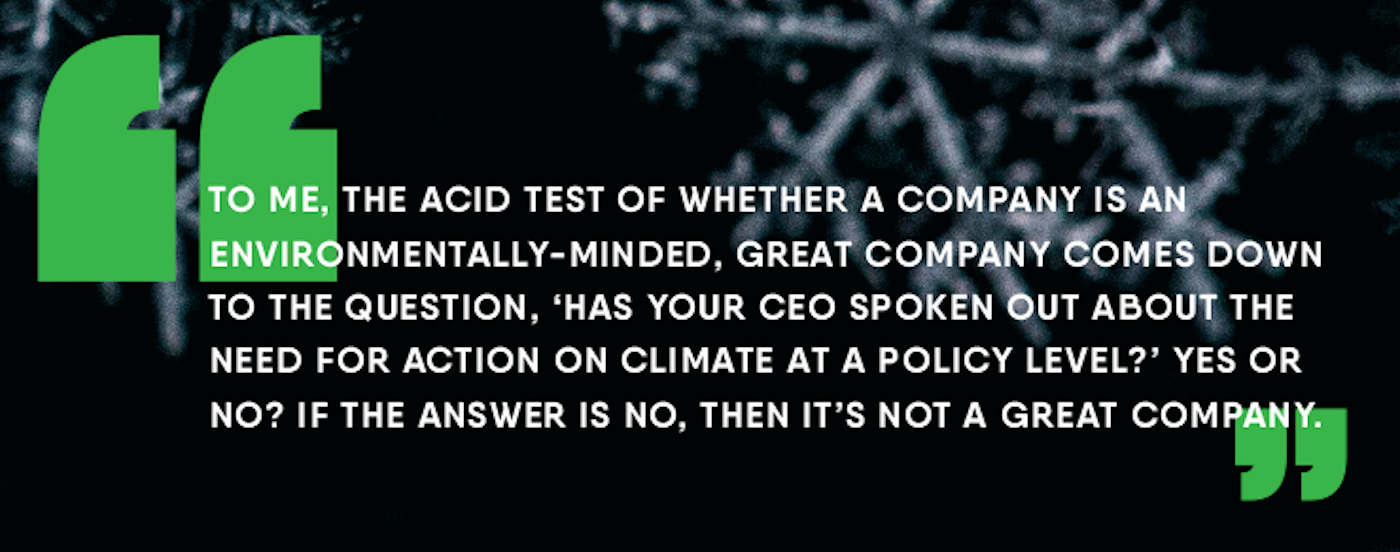
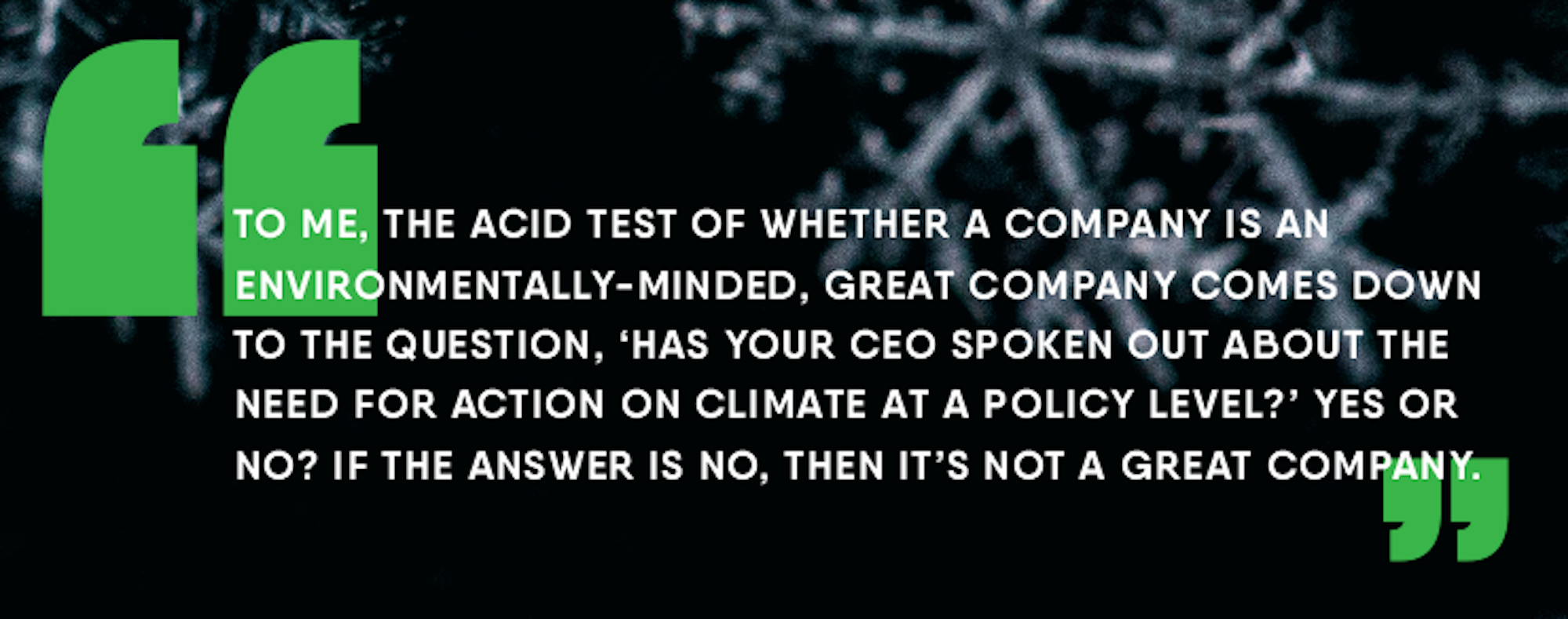
Squaw Valley Alpine Meadows has also taken top-level action. CEO Andy Wirth was instrumental in convincing Liberty Utilities, Squaw Alpine’s Nevada-based energy provider, to move away from the use of coal by leveraging its business clout.
“We are the number two customer at Liberty Utilities. We have a huge energy bill and three or four years ago we demanded they eliminate coal from the grid,” Wirth explains. “On January 1, 2016, when people turned on their lights here in this region, their energy was no longer supplied by coal.”
That was just a small step, though, as Wirth continued to use Squaw’s leverage as Liberty’s number two buyer, pushing the utility to move even more towards renewable energy. “Not only have we moved off of coal,” says Wirth, “but have 20 to 30 percent of our grid being fueled by solar panels out in western Nevada.”
In New Mexico, Taos Ski Valley became the first ski resort in the world to be certified as a B Corporation in February, 2017. B Corporations are for-profit businesses certified to meet the highest standards of overall social and environmental performance, transparency and accountability, and to use the influence of business to solve worldly social and environmental problems.
“As the awareness of what it means to be a B Corporation increases, the suppliers and partners of ours will also move in that direction,” says Taos Ski Valley CEO David Norden. “Rarely does a high profile ski resort where the consumers are visiting and spending time on its property meet B Corp standards. There’s a high level of exposure to what we’re doing, which can help get the message out and other entities to jump on board.”


These three examples involve private companies. In July 2017, Vail Resorts, a publicly traded company with enormous influence, announced its EpicPromise program to cut net emissions to zero by 2030. Because of Vail’s standing as a massive, publicly traded business with hundreds of thousands of shareholders, their public commitment to combat climate instability can drive real change.
“Vail Resorts recognizes the significant potential for public policies to positively affect renewable energy advances and climate change. Part of our EpicPromise commitment is specifically to advocate to bring on more renewable clean energy,” says Vail Resorts’ Director of Sustainability Rob Whittier.
ASC, Squaw Alpine, TSV and Vail Resorts are all examples of larger resort corporations. But what about smaller ski areas that don’t have the time, money or staffing in place to focus on these macro level policy statements? That’s where Protect Our Winters (POW) comes in. Pro snowboarder Jeremy Jones founded the Boulder, Colorado-based non-profit climate advocacy group in 2007. By utilizing its massive, impassioned community to lobby for policy change on the state and federal levels, POW is leading the charge of the snowsports community to combat climate change.
POW has developed its own Resort Alliance, which is a program that gives ski resorts the tools and resources they need to take meaningful action on climate and to engage their customers in conversations about climate change. Because many of these resorts are already stretched to thin to get directly involved with legislation, POW also acts as the liaison between national movements and the resorts.
“Basically I don’t have the time or the personnel to read, listen and fully dive into every single action that there is legislatively. POW assists in clueing us into the national efforts,” explains Maura Olivos, sustainability coordinator and ecologist for the Alta Environmental Center—a sentiment shared by many of the smaller resorts working with POW.
However, Olivos and POW agree that with the recent dramatic actions taken on the national level—the proposal to defund the Clean Power Plan and pulling out of the Paris Agreement, for example— the climate fight will be on the state and local levels of government. States with robust ski tourism like California, Washington, Vermont, Oregon, Colorado and New York joined the United States Climate Alliance, a group committed to upholding greenhouse gas reduction objectives of the Paris Agreement. Resorts are also acting locally. Partnerships with local advocacy groups, like A-Basin’s with the High Country Conservation Fund or Taos’ work with the Rio Grand Water Fund, can help make a difference regionally.


In addition to politics and advocacy, the POW Resort Alliance also seeks to help resorts engage their consumer bases in conversations about climate change. On that front, resorts like Aspen Snowmass and Arapahoe Basin have embroidered the POW logo on the jackets of its employees, and Powder Mountain, in Utah, has the logo placed on the beanies of resort workers.
“We put the POW logo on each uniform and do training with all of our staff,” explains Sha Miklas, sustainability manager at Arapahoe Basin. “The hope is that our guests will ask our employees,
‘What is that?’ And then hopefully the employees can give them a good response to spark some sort of conversation around climate and why it’s important.”
“We aren’t expecting people to become climate scientists overnight but to at least understand that the resort is supportive of the cause and that they can get as involved as they want to in terms of educating themselves,” says Amanda Ballenger, community relations director at Powder Mountain.
Striking up a conversation with guests is the first step in pointing them to the POW Seven, a seven-step guide to taking action against climate change.
Whether it’s top-level resort executives speaking out to enact change, partnering with local establishments to do so on the state level or simply engaging consumers, resorts and the ski industry hold a massive amount of power in the fight against climate change. In fact, on September 13, 2017 POW, along with professional athletes and representatives from ASC and the California Ski Industry Association came together in Washington D.C. to meet with members of congress and attend a hearing put on by the House Climate Solutions Caucus. As long as action is being taken, the battle is in their favor.
“When you ask someone, ‘do you believe in climate change?’ it suggests that it’s a function of faith. It’s not, it’s a function of intellect,” says Wirth. “This is why we have to find ourselves in a constant state of action. We may lose small battles but we’re still here and will win the war.”


![[GIVEAWAY] Win a Legendary Ski Trip with Icelantic's Road to the Rocks](https://www.datocms-assets.com/163516/1765233064-r2r26_freeskier_leaderboard1.jpg?w=200&h=200&fit=crop)
![[GIVEAWAY] Win a Head-to-Toe Ski Setup from IFSA](https://www.datocms-assets.com/163516/1765920344-ifsa.jpg?w=200&h=200&fit=crop)


![[GIVEAWAY] Win a Legendary Ski Trip with Icelantic's Road to the Rocks](https://www.datocms-assets.com/163516/1765233064-r2r26_freeskier_leaderboard1.jpg?auto=format&w=400&h=300&fit=crop&crop=faces,entropy)


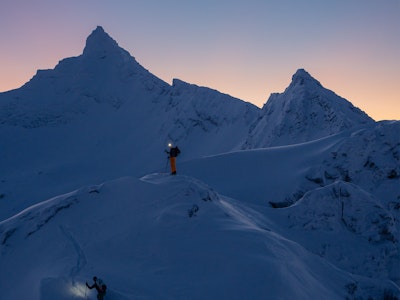
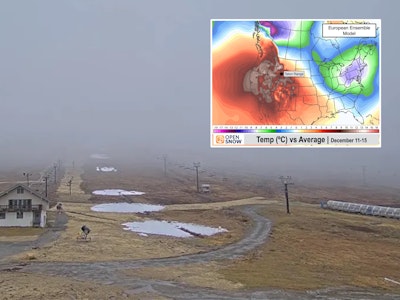
![[GIVEAWAY] Win a Head-to-Toe Ski Setup from IFSA](https://www.datocms-assets.com/163516/1765920344-ifsa.jpg?auto=format&w=400&h=300&fit=crop&crop=faces,entropy)
